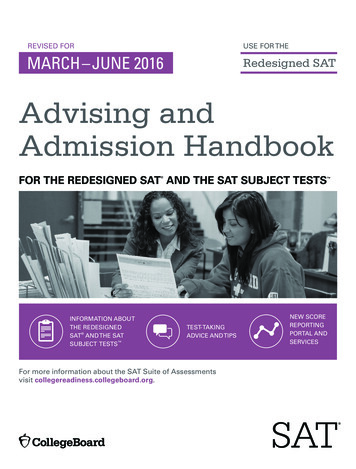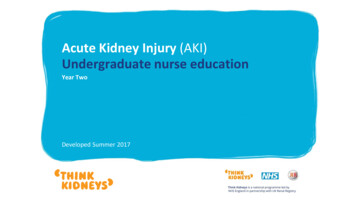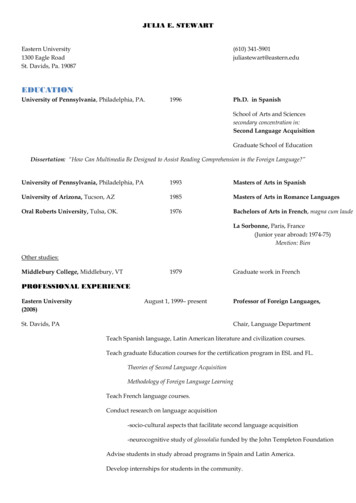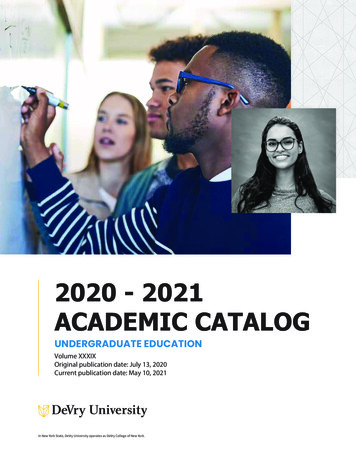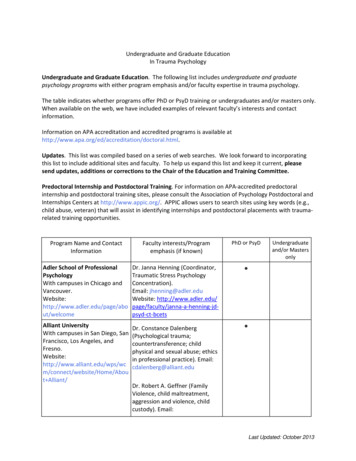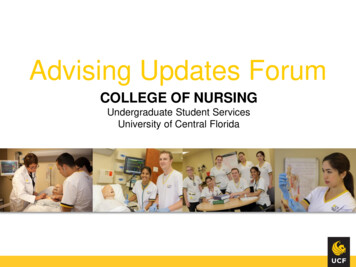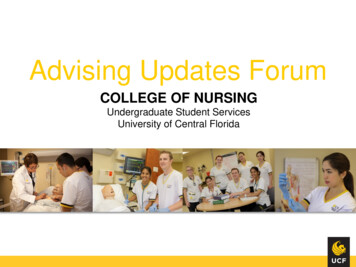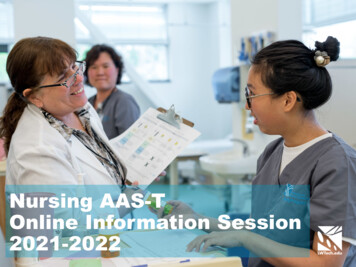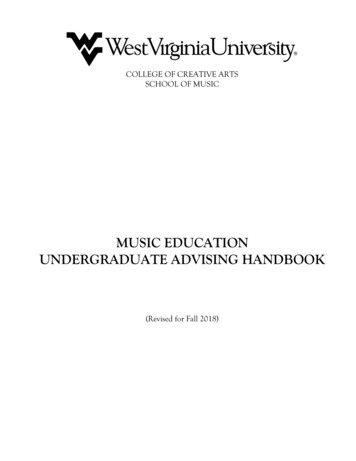
Transcription
COLLEGE OF CREATIVE ARTSSCHOOL OF MUSICMUSIC EDUCATIONUNDERGRADUATE ADVISING HANDBOOK(Revised for Fall 2018)
Table of ContentsWVU Music Education Program Mission . 3Music Education Faculty . 3WVU Bachelor of Music in Music Education Four-Year Plan . 4Music Education Curriculum Checklist . 5WVU Professional Education Dispositions and Responsibilities . 6WVU Professional Education Dispositions . 6WVU Music Education Professional Responsibility Statement . 6WV Department of Education Clinical Hour Requirement . 7College of Education and Human Services Clinical Experiences Requirements . 8General Statement . 8College of Education and Human Services Criminal Background Check Information and Procedure . 8Undergraduate Academic Progress – School of Music . 11Undergraduate Academic Progress –Music Education Area . 12Music Education “Progress-to-Degree” Review . 12Music Education Retake Policy . 12Distribution of Courses in the Music Education Curriculum with Respect to GPAs . 13Principal Instrument Requirements . 14Jury Progress . 14Secondary Instrument Placements and Proficiencies . 15Policies Governing Voice Placement Examination . 15Policies Governing Piano Placement and Proficiency Examinations . 15Policies Governing Secondary Instrument Proficiency Examinations . 16Secondary Instrument Proficiency Examinations Record. 19School of Music Instrument Control Policy . 20Music Education Area Double Major and Double Emphasis Policy . 21School of Music Secondary Applied Study Policy . 21Music Education Area Transfer Student Policies . 22PRAXIS Series Examinations . 23Prerequisites for Music Education Methods Courses . 26Prerequisites Deadline for Music Education Methods Courses . 27Student Teaching in Music Policies and Procedures. 282
WVU Music Education Program MissionThe mission of the Music Education program at West Virginia University is to raise the status ofmusic education in the eastern United States through the cultivation of highly effective practice andrelevant knowledge in undergraduate students, graduate students, and in-service music educators.Students successfully completing the music education curriculum and all tests required by theWest Virginia Department of Education will be qualified for a professional certificate, Birth-Adult, whichenables them to teach instrumental, vocal, and general music in the public schools of West VirginiaThe music education curriculum at WVU is unusually well-rounded and prepares students for awide variety of teaching settings. Types of courses in the curriculum include those that increase skills as amusician; those that develop knowledge of teaching, learning, and schools; those that increase skills as ateacher and performer of various instruments and voice; those that cultivate skills as a teacher in each ofthe three major areas of music education (general music, choral music, and instrumental music); and thosethat balance professional specialization in music. A capstone experience featuring a fourteen-weeksupervised teaching internship in K-12 schools is also included.Several distinct advantages for students enrolled in the WVU music education program are: acomprehensive curriculum, excellent and varied musical ensembles, nationally recognized faculty, talentedstudent colleagues, unique curriculum opportunities, and an outstanding faculty/student ratio. Theseadvantages have resulted in a full-time teaching position placement rate of 100% for non-placeboundgraduates over the past several years. WVU Music Education graduates also compete favorably withgraduates of other regional institutions for admission to prestigious graduate programs in music.Music Education FacultyDr. Sandra Schwartz, Associate ProfessorCoordinator of Music EducationPh.D. (University of Miami)Sandra.Schwartz@mail.wvu.edu(304) 293-4562Dr. Angela Munroe, Assistant ProfessorPh.D. (University of Colorado Boulder)Angela.Munroe@mail.wvu.edu(304) 293-45403Dr. Jason Gossett, Assistant ProfessorPh.D. (Pennsylvania State University)Jason.Gossett@mail.wvu.edu(304) 293-4841
WVU Bachelor of Music in Music EducationFour-Year PlanMUSC**MUSC 119-127DMUSC 130-133MUSC 138MUSC 161MUSC 162GEF 1 (ENGL 101)*MUSC 191GEFMajor EnsembleApplied Music (Lessons)Class PianoVoice ClassAural Theory IWritten Theory IComp. & Rhet.First Year Seminar1-221222323-4TOTALMUSC**MUSC 119-127DMUSC 130-133MUSC 163MUSC 164MUSC 177MUSC 180MUSC 189MUSC 280 or 28119-20 MUSC***GEFSECOND YEAR - FALLMUSC**MUSC 219-227DMUSC 130-133MUSC 189MUSC 200MUSC 261MUSC 262MUSC 270 (GEF 6)MUSC 280, 281, or 284GEF 1 (ENGL 102)*Major EnsembleApplied Music (Lessons)Class PianoMusic ConvocationFundamentals of ConductingAural Theory IIIWritten Theory IIIMusic History IWW, Brass, or Vocal Ped.Comp. & Rhet.Major EnsembleApplied Music (Lessons)Music ConvocationConducting & RehearsingString or Perc. Ped.Inst., Choral, or Gen. Music Meths.Learning-Education Setting1-2210222323TOTALMUSC**MUSC 219-227DMUSC 130-133MUSC 189MUSC 201MUSC 263MUSC 264MUSC 271W**** (GEF 8)MUSC 280, 281, or 284GEFMajor EnsembleApplied Music (Lessons)Inst., Choral, or Gen. Music Meths.Arranging in the Public SchoolsReading in the Content AreasMajor EnsembleApplied Music (Lessons)Class PianoMusic ConvocationConducting and Score Interp.Aural Theory IVWritten Theory IVMusic History IIWW, Brass, or Vocal TAL17-181024TOTAL16THIRD YEAR - SPRING1-220223333TOTALMUSC**MUSC 319-327DMUSC 189MUSC 282 or 283MUSC 380, 381, or 382GEFGEFSPED 360Major EnsembleApplied Music (Lessons)Music ConvocationString or Perc. Ped.Inst., Choral, or Gen. Music Meths.Diff. Instr. Spec. Needs18-19FOURTH YEAR - FALLMUSC**MUSC 419-427DMUSC 380, 381, or 382MUSC 384GEFGEFRDNG 4221-22122110213-4TOTALSECOND YEAR - SPRINGTHIRD YEAR - FALLMUSC**MUSC 319-327DMUSC 189MUSC 202MUSC 282 or 283MUSC 380, 381, or 382EDUC 301GEFGEFMajor EnsembleApplied Music (Lessons)Class PianoAural Theory IIWritten Theory IIIntro. Music ListeningIntro. Music EducationMusic ConvocationWW or Brass Ped.Chamber EnsembleFOURTH YEAR - SPRING1-223233-43TOTALMUSC 491AMUSC 487C&I 491Prof. Field Exp (Extended Learning)Student Teaching Sem-CapstoneProf. Field Exp: Student Teach.17-19* Students receiving a score of 27 on the ACT exam or a score of 640 on the SAT verbal exam may take the accelerated ENGL 103 course in placeof ENGL 101 and ENGL 102.** Major Ensembles include MUSC 300, MUSC 300A, MUSC 300B, MUSC 302, MUSC 303, MUSC 305, MUSC 305A, MUSC 353, MUSC 353A.*** Chamber Ensembles include MUSC 150, MUSC 340-349, MUSC 351-352, MUSC 353B, MUSC 353C, MUSC 353E, MUSC 353G, MUSC 353H, MUSC 354-359.**** M271W may be taken in the spring of either the second or third year.General Comments:* Prior to entering the methods classes, documentation of passing CORE Exams or exempting SAT/ACT scores must be given to the advisor.* Prior to student teaching, Music Content Knowledge Exam must be passed (in third year).* For students wishing certification in states that require the PLT Praxis Exam (including West Virginia), it is recommended that it be taken prior to or during studentteaching.* Total hours for the Bachelor of Music in Music Education degree is 142-153.* The above Four-Year Plan is based upon students entering the Music Education program with a Level 0 on Piano.* The above Four-Year Plan includes Voice Class for those not obtaining credit by exam or through exemption.* SPED 304 is a required course in the Music Education curriculum and fulfills GEF 4.* Students should consult the WVU Undergraduate Catalogue, the Semester Schedule of Courses, and their advisor for requirements in the General Education Foundations(GEF)4
Music Education Curriculum Checklist5
WVU Professional Education Dispositions and ResponsibilitiesWVU Professional Education DispositionsSuccessful candidates: assume responsibility for supporting and accommodating learning and development for all whomthey serve, model integrity and a commitment to the highest professional ethics, demonstrate in-depth knowledge of their content areas, inquire into their practice through systematic review, assessment, and reflection, and grow as collaborative members of and leaders in their professional communities and as members of aglobal society characterized by change.WVU Music Education Professional Responsibility StatementThe Music Education Faculty within the WVU College of Creative Arts School of Music encouragesand expects professionalism in all students enrolled in a Music Education degree program. Professionalismshould pervade all aspects of a student’s work, character, and conduct. In addition to developing skillsnecessary to plan and implement instruction, students should demonstrate a commitment to professionalismin problem solving and decision-making. Students in this professional degree program understand that theywill display their professional ethics in daily interactions with peers, educators, and the community.Professionalism is demonstrated most clearly in the following ways: being punctual; presenting work that iswell-prepared and accurate; attending classes and other pre-service professional development opportunities ona regular basis; participating in discussions that are both thoughtful and thought-provoking reflections ofMusic Education experiences; maintaining timely progress-to-degree; and maintaining an air of respect,honesty, and rapport with peers, professors, K-12 school teachers and students, and community members.Professionalism extends into all forms of communication. This includes using social media for socialnetworking only and not for professional communication. Pre-service teachers are expected to conveyprofessionalism in all activities - face-to-face, telephone, email, online - and this means refraining from usingprint or electronic media to post disparaging or objectionable comments or activity that is in any way relatedto West Virginia University. In addition, Music Education students are expected to use Standard English, aswell as MIX or an email account with an address that conveys an appropriate professional presence. Whenparticipating in school-based field experiences and internships, Music Education students must abide by eachschool district's code of ethics and dress code. All Music Education students are expected to follow WVU,local, and state policies, laws, and regulations.6
WV Department of Education Clinical Hour RequirementThe West Virginia (WV) Department of Education requires students in all education degreeprograms on the WVU campus and throughout the state to complete 125 clinical hours prior to studentteaching to achieve WV certification. The clinical requirement specifies 80 hours in K-12 school-based ornon-school-based settings under the supervision of a certified teacher and 45 additional non-supervised hoursin other settings (e.g. university-sponsored camps and events, community programs, church-sponsored youthgroups, clinics/events sponsored by professional organizations).WVU music education majors currently meet 40 of the 80 hours required in public school settings intheir coursework: 6 hours in MUSC 380, 30 hours in MUSC 382, and 4 hours in SPED 360. To completethe remaining hours (beyond the 40 hours included in coursework), students are responsible for arrangingtheir own clinical experiences. Use the form below as a guide and report such experiences online quirement-form/.Student NameAdvisorEntering music education inI.Clinical experiences taking place in K-12 school-based or non-school based settings and under thesupervision of a certified teacher; e.g. school-sponsored summer program/camps. (40 hours required)SettingType of ExperienceHours CompletedDateTotalII.Clinical experiences in settings other than schools; e.g. university-sponsored camps and events,community programs, church-sponsored youth groups, clinics/events sponsored by professionalorganizations. (45 hours required)SettingTotal7Type of ExperienceHours CompletedDate
College of Education and Human ServicesClinical Experiences RequirementsGeneral StatementPrior to working in any clinical or field-based experience in schools, all students must: a) haveproof of a negative TB test within the past 2 years, and b) take responsibility for completing a criminalbackground check. The College of Education and Human Services provides the following assistance tostudents:TB Test: The College offers a TB/PPD clinic at the beginning of each semester on campus in 802AAllen Hall. Students must attend two clinics: one for test administration and a second for test screening.Results and documentation will be given at test reading. Students who are unable to attend the clinic asscheduled can call 304-293-2311 to arrange another time. Test administration costs 20.00. Any studentwith a history of receiving BCG vaccine in the past should get a "T-spot" test at the Monongalia CountyHealth Department instead of a PPD. Those students can call Charleen Morgan, RN at 304-293-5118 toschedule the test.Criminal Background Check: The College of Education and Human Services has developed proceduresfor assisting education students in all fields to secure a criminal background screening that is oftenrequired by West Virginia public schools, public schools in other states, and other agencies. All studentswith clinical or field-based experiences in their programs of study are responsible for obtaining furtherinformation about this at http://cehs.wvu.edu/background check information.College of Education and Human Services Criminal Background Check Information and ProcedureIncreasingly, students are required by clinical agencies, including school counties and districts, toundergo a criminal background check prior to field/clinical experiences. Felony convictions and someserious misdemeanors may preclude participation in field/clinical placements. This could, in turn,prevent the completion of field/clinical course requirements and completion of programs in the Collegeof Education and Human Services that require such placements.8
In addition, the West Virginia State Code states the following:§18A-3-10. Criminal history check of applicants for licensure by the state department ofeducation.Beginning the first day of January, two thousand two, any applicant for an initial license issuedby the West Virginia department of education shall be fingerprinted by the West Virginia statepolice in accordance with state board policy in order to determine the applicant's suitability forlicensure. The fingerprints shall be analyzed by the state police for a state criminal history recordcheck through the central abuse registry and then forwarded to the federal bureau ofinvestigation for a national criminal history record check. Information contained in either thecentral abuse registry record or the federal bureau of investigation record may form the basis forthe denial of a certificate for just cause. The applicant for initial certification pays for the cost ofobtaining the central abuse registry record and the federal bureau of investigation record.Upon written consent to the state department by the applicant and within ninety days of thestate fingerprint analysis, the results of a state analysis may be provided to a county board withwhich the applicant is applying for employment without further cost to the applicant.Information maintained by the state department or a county board which was obtained for thepurpose of this section is exempt from the disclosure provisions of chapter twenty-nine-b of thiscode. Nothing in this section prohibits disclosure or publication of information in a statistical orother form which does not identify the individuals involved or provide personal information.Therefore, undergraduate and graduate students who consent to having a criminal background checkbefore beginning field/clinical courses will increase the likelihood of placement. Undergraduate andgraduate students who do not consent to a background check must understand and acknowledge thatagencies, county school systems, or school districts of placement (hereinafter referred to as the “ClinicalAgency” or “Clinical Agencies”) may refuse to allow the student to participate in field/clinicalexperiences. If the student is unable to participate in field/clinical experiences, the student will not beable to complete field/clinical course requirements and, therefore, will not be able to meet requirementsto complete the selected program.9
To effectuate the necessary field/clinical experiences for undergraduate and graduate studentswithin the College of Education and Human Services (hereinafter referred to as the “College”), thefollowing procedures have been established:1.Upon admission to programs with clinical placement courses and before participation infield/clinical experiences, students will be directed to a third party provider of backgroundchecks to complete a criminal background check. Students are responsible for all fees associatedwith the background check, and for challenging or appealing any results that, in the student’sopinion, are inaccurate.2.Students will be asked by the background check provider to authorize disclosure of the results ofthe background check to any Clinical Agencies that require a background check prior toplacement.3.The Clinical Agency, in its sole discretion and upon its review of the background check results,may refuse to allow the student to participate in field/clinical experiences at the Clinical Agency.4.In the event that a particular Clinical Agency refuses to allow the student to participate infield/clinical experiences, the College will take steps to refer the student to another ClinicalAgency; however, the College cannot guarantee that a placement will be made at another ClinicalAgency.5.Students are advised to maintain a clean background absent of any criminal arrests orconvictions. As necessary, students may be required by a Clinical Agency to have an updatedbackground check performed. Furthermore, Clinical Agencies may require a student toimmediately report any new arrests or convictions that occur during the pendency of afield/clinical experience.6.The College will neither request nor seek results of any background check to which a studentagrees under this procedure.7.The various Clinical Agencies may from time to time implement background check standardsthat are more or less burdensome. Officials within the College can never state to any degree ofcertainty the background check parameters of any given Clinical Agency, and officials within theCollege will not speculate whether a Clinical Agency might refuse a particular student.10
Undergraduate Academic Progress – School of MusicApproved by the Music Faculty - April 2, 1992Reconfirmed by the Academic Standards Committee - April 6, 2001Revised – August 24, 2012The Music Faculty has adopted this statement on academic progress in music courses so thatstudents complete a degree program in a reasonable period of time. Full-time undergraduate musicstudents are expected to complete in a timely fashion the "core" music classes, as follows:Year 1MUSC 191 or equivalent (First Year Seminar)MUSC 189 (Music Convocation) – 1 semesterMUSC 161 (Aural Theory I)MUSC 162 (Written Theory I)MUSC 163 (Aural Theory II)MUSC 164 (Written Theory II)MUSC 177 (Introduction to Music Listening)Year 2MUSC 189 (Music Convocation) – 2 semestersMUSC 200 (Fundamentals of Conducting)MUSC 261 (Aural Theory III)MUSC 262 (Written Theory III)MUSC 263 (Aural Theory IV)MUSC 270 (History of Western Musical Traditions I)Piano level 2 (as a secondary instrument)- and MUSC 264 (Written Theory IV)- or MUSC 271W (History of Western Musical Traditions II) –Note: English 102 must precede enrollment in MUSC 271WStudents who do not meet these expectations will receive a letter of warning at the end of therelevant semester. Students who fail or withdraw from any one of these courses must pass it the nexttime it is offered. Any student who does not complete these courses with passing grades within oneyear of schedule will be dismissed (suspended) from the music program, unless there are compellingextenuating circumstances.11
Undergraduate Academic Progress –Music Education AreaFull-time undergraduate music education students are expected to begin methods courses(MUSC 380, MUSC 381, MUSC 382) in a timely fashion - normally in the fifth semester in the major.This expectation requires that students satisfy all prerequisites for music education methods courses bythe specified deadline (see pp. 25-26). Students who do not meet this expectation will receive a “letter ofconcern” from the Music Education faculty as part of a “progress-to-degree” review (see below). Ifstudents who do not meet this expectation are receiving any form of School of Music financial aid, theMusic Education faculty may make a firm recommendation to the Scholarship Committee regardingcontinuation or revocation of this support.Music Education “Progress-to-Degree” ReviewThe Music Education faculty will meet once each semester to review students of concern.Students who are not making appropriate progress-to-degree or who do not demonstrate personal and/orprofessional characteristics suitable for the profession will receive a “letter of concern” from the MusicEducation faculty.Music Education Retake PolicyMusic Education students who withdraw from or earn a grade of "D" or "F" in MUSC 138,MUSC 180, MUSC 200, MUSC 201, MUSC 202, MUSC 280, MUSC 281, MUSC 282, MUSC 283,MUSC 284, MUSC 380, MUSC 381, MUSC 382, MUSC 384, MUSC 487, or MUSC 491 the firsttime they take any of these courses are required to retake the course within one calendar year (assumingcontinuous academic year enrollment) in order to remain in Music Education. Students who withdrawfrom or earn a grade of "D" or "F" the second time they take any of these courses will not be permitted totake the course again and must pursue a major other than Music Education.12
Distribution of Courses in the Music Education Curriculum with Respect to GPAsOverall GPA (min. 2.75)All courseworkProfessional Education GPA (min. 2.75)MUSC 180Core Music GPA (min. 2.75)MUSC 130MUSC 131MUSC 132MUSC 133MUSC 138MUSC 280MUSC 281MUSC 282MUSC 283MUSC 284MUSC 380MUSC 381MUSC 382EDUC 301SPED 304SPED 360RDNG 422MUSC 487MUSC 491C&I 491MUSC 189MUSC 191MUSC 161MUSC 162MUSC 163MUSC 164MUSC 261MUSC 262MUSC 263MUSC 264MUSC 200MUSC 201MUSC 202MUSC 177MUSC 270MUSC 271MUSC 384Applied StudyEnsembles (1 maj ens/sem 1 sem chamber ens)13
Principal Instrument Requirements Each student is required to register for applied lessons on his or her principal instrument everysemester he or she is enrolled as a music student (excluding the semester he or she studentteaches). Each student is required to participate in a major ensemble on his or her principal instrument(MUSC 300, MUSC 300A, MUSC 300B, MUSC 302, MUSC 303, MUSC 305, MUSC 305A,MUSC 353, MUSC 353A) every semester he or she is enrolled as a music student (excluding thesemester he or she student teaches). Each student is required to present a minimum of two separate solo performances on his or hermajor instrument on two upper-level Music Convocation recitals before student teaching.Applications to perform on an upper-level recital may be obtained from the School of Musicoffice (Room 416A). Upon a successful performance, a copy of the upper-level recital programwill be placed by the Instructor of Music Convocation in the student’s permanent file in theCCA Records office. The above recital requirement may also be fulfilled by presenting a half or full recital. To obtaincredit, students do not need to register for any course, but must submit a program to the CCARecords office once the recital has been successfully completed.Jury Progress(effective Fall 2004)All music majors, music minors, and non-majors if on music scholarship enrolled in MUSC 119427D, MUSC 500, or MUSC 700 in the Fall and/or Spring Semesters must take a jury. Exceptions willbe allowed only in the following cases: 1) when an area jury policy has a provision for a waiver, and 2) inthe event of illness or injury. Students who miss juries due to illness or injury will receive an Incompletein Applied Study for the semester and must make up the jury during the subsequent semester prior tomid-term.Students who are unable to make up a missed jury must submit a written petition to the Schooldirector by mid-term of the first semester following the semester of the original missed jury. The petition14
must include a complete justification for missing the make-up jury and a written statement of supportfrom the applied faculty member.After each jury, any student who makes insufficient progress or who is judged not to havesufficient potential to complete program requirements will be placed on applied music probation andwill receive a letter stating the terms of the probation from the Chair of the School of Music AcademicStandards Committee. If these terms of probation are not met in the prescribed time period, any suchstudent's enrollment in the music program will be discontinued.Secondary Instrument Placements and ProficienciesPolicies Governing Voice Placement Examination All students entering the Music Education program who are not voice principals must register forMUSC 138 (Voice Class).Entering students who are not voice principals but who have a voice background may take theVoice Placement Examination to receive credit for MUSC 138.Only students registered for MUSC 138 will be allowed to take the exam.Materials for the exam are available the first class meeting of MUSC 138 or from Dr. SandraSchwartz in Room 4079.Students may take the exam only during the first week of class.Students are allowed to take the exam only once.Students who have failed MUSC 138 are not eligible to take the exam.The exam will be administered individually by members of the music education faculty.Dr. Schwartz will oversee the scheduling of exams.Students will pass the exam only if they have earned “satisfactory” or “excellent” in all of theevaluative categories on the exam.The Coordinator of Music Education, the College of Creative Arts Admissions and RecordsOffice, and Music Education Advisors will be notified of those students who have passed theexam.Students who pass the exam will be given credit by examination and the option of droppingVoice Class.All students who fail the exam will be required to complete MUSC 138.Policies Governing Piano Placement and Proficiency Examinations 15All students entering the Music Education program who have very limited or no pianobackground must register for MUSC 130 (Piano Class Level 0).Entering students who have a piano background must take a Piano Placement Examination aspart of their entrance audition to be placed into the appropriate level of class piano. Students
who do not take this exam at the time of their audition must contact the Coordinator of ClassPiano (Dr. Lucy Mauro) to take this exam prior to the start of their first semester of classes.Music Edu
supervised teaching internship in K-12 schools is also included. Several distinct advantages for students enrolled in the WVU music education program are: a comprehensive curriculum, excellent and varied m

